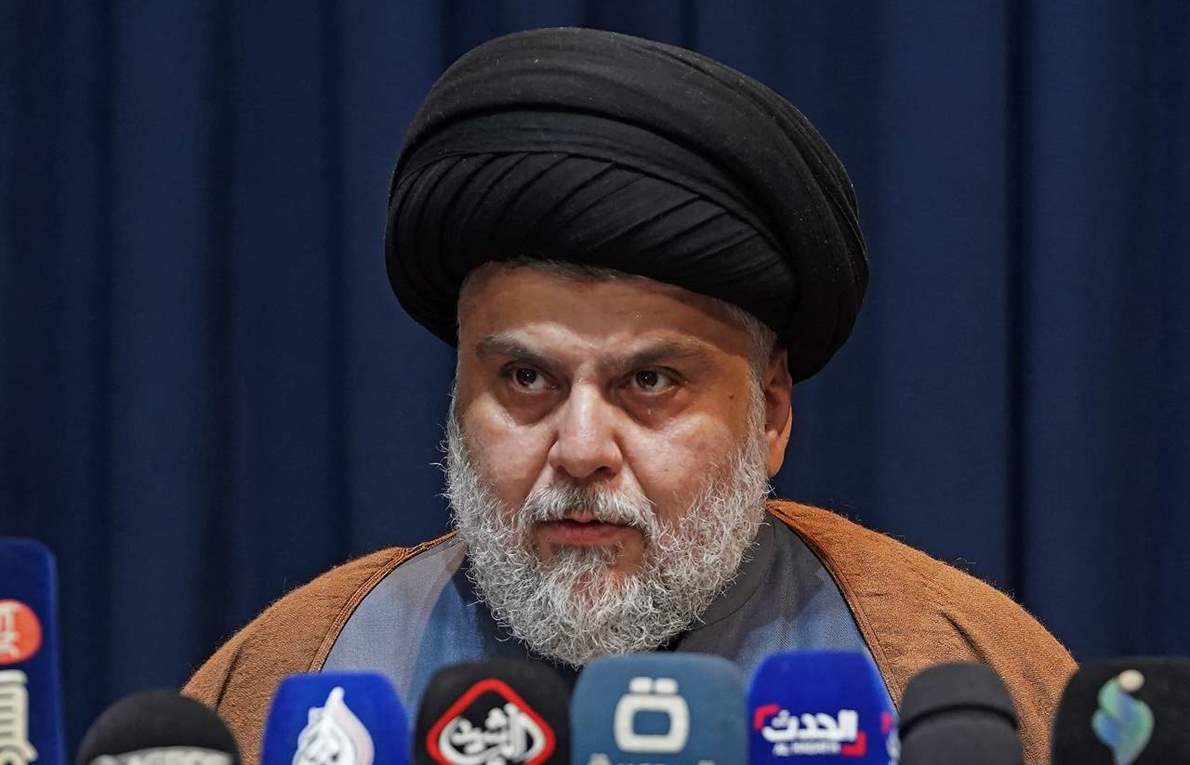Of all the Iraqi religious scholars turned politicians,
Shiite cleric Muqtada Al-Sadr is the most controversial, bold and charismatic.
He comes from a family that has stood up to oppressive regimes on nationalistic
grounds. At 47, he is still young and relatively inexperienced. Once an ally of
Iran, he is now distancing himself from Tehran but is also careful to underline
his hostility to US presence in his war-torn country.
اضافة اعلان
 Iraqi Shiite Muslim cleric Moqtada Al-Sadr gives a news conference in the central holy shrine city of Najaf on November 18, 2021. (Photo: AFP)
Iraqi Shiite Muslim cleric Moqtada Al-Sadr gives a news conference in the central holy shrine city of Najaf on November 18, 2021. (Photo: AFP)
At one point he led an armed militia,
Al-Mahdi Army, to fight the Americans, only to break it up and form a political
coalition of like-minded figures that is proud of its Shiite background but not
at the expense of the Iraqi national and Arab identity. Between the 2003 US
invasion resulting in the dismantling of the Baath Arab Party rule and the
chaotic set up of an ethno-sectarian political setup, Al-Sadr never fully
embraced the new system, even when the Shiite politicians were firmly in
control of the country.
Of the major Shiite blocs and political
parties, he is the only one who was brave enough to denounce the political quota
system and the rampant corruption beleaguering the new Iraq. And he is among a
few political figures who have called for the dissolution of the armed pro-Iran
militias that were formed to stand up to Daesh, a radical Sunni revisionist
movement that at one point was only a few kilometers from taking Baghdad.
The last decade, with its myriad political
and economic seismic events, ripened Al-Sadr’s political vision. He remains a
charismatic figure, especially among Iraqi’s disenfranchised Shiites who failed
to benefit from the rise of powerful leaders such as Nuri Al-Maliki and Haidar
Al-Abbadi.
This is perhaps why Al-Sadr’s Sairoon
alliance emerged as a clear winner in last October general elections, at the
expense of pro-Iran blocs including Hadi Al-Amiri’s Al Fatah coalition, a
political front for pro-Iran militias. The phenomenal rejection by voters
included Maliki, Abbadi, Ammar Al-Hakim and Iyad Alawi.
They all rejected the outcome of the
elections, claiming nation-wide fraud, and Amiri and his ally Qais Al-Khazali
threatened to use force. Their firebrand rhetoric may have prompted the failed
assassination attempt last November on Prime Minister Mustapha Al-Kadhimi.
The Shiite powers formed a Coordination
Framework that called for a manual count of the ballots. And when the election
committee confirmed the results after such a count, they invited Al-Sadr to a
meeting. None wanted to dispose of the quota system that favored them. But
Al-Sadr had another objective in his mind. He reiterated that he now wanted to
form a national majority government that would be neither eastern nor western;
i.e., an end to the convenient status quo that had brought the country to its
knees for more than a decade.
He will either form such a majority government,
with the help of the Sunni Arabs, the Kurds and independents who were behind
the 2019 mass protests or else sit in the opposition.
He would welcome others to join but on his
own terms. Even then, his demand that the pro-Iran militias be dissolved stands
while he continues to promise to expose those behind the Kadhimi assassination
attempt.
And when push comes to shove, Al-Sadr and
his new-found allies, including Sunni Arabs (Mohamed Al-Halbousi’s Taqaddum),
Kurds (Barazani branch) and independents, do have the upper hand. His rivals,
under the umbrella of the Coordination Framework, may soon lose the glue that
keeps them together when they realize that the election results will not be
overturned.
Al-Sadr is proving to be a maverick by
opposing the Americans and insisting on doing away with pro-Iran militias. The
timing is important and may be on his side. The Americans are leaving by the
end of the year as they review their military presence in the Middle East. The
threat of pro-Iran militias subjugating the political system has subsided since
the assassination of Qasem Soleimani last year. It is now clear that Iran’s
grip over Iraq is waning and for many reasons. The Iraqis are fed up with
Iranian meddling, with the vast corruption of the ruling political class and with
the failure to deal with existential economic, political and environmental
challenges.
Al-Sadr had praised Kadhimi’s efforts to
keep Iraq neutral in the US-Iran showdown. He may even choose him to stay as prime
minister, even if this is anathema to his Shiite rivals. This would be a major
step forward for Iraq, which is trying to revive its national identity and
rejoin the Arab fold.
If Al-Sadr succeeds in toppling the
ethno-sectarian system, it will be an historic milestone in the country’s
recovery. His failure would be disastrous on all fronts, so his gambit must
succeed.
The writer is a journalist and political
commentator based in Amman.
Read more Opinion and Analysis



